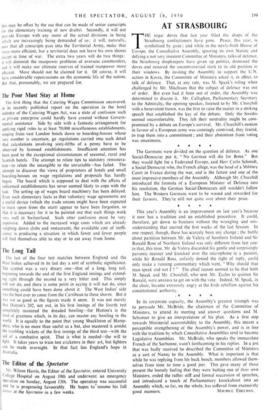AT STRASBOURG
THE sugar doves that last year filled the shops of the Strasbourg confectioners have gone. Peace, this year, is symbolised by guns ; and while in the newly-built House of Europe, the Consultative Assembly, ignoring its own Statute and defying a not very insistent Committee of Ministers, talks of defence, the Strasbourg shopkeepers have given up politics, dismissed the doves and restored the uncontroversial stork to its old position in their windows. By inviting the Assembly to support the U.N. action in Korea, the Committee of Ministers asked it, in effect, to talk of defence. That, at any rate, was M. Spaak's ruling when challenged by Mr. Mitchison that the subject of defence was out of order. But even had it been out of order, the Assembly was determined to discuss it. Mr. Callaghan, Parliamentary Secretary to the Admiralty, the opening speaker, listened to by Mr. Churchill with a benevolent frown, was the first to raise the matter in a striking speech that established the key of the debate. Only the Swedes seemed uncomfortable. They felt their neutrality might be com- promised by a debate on Europe's survival. Mr. Churchill's motion in favour of a European army was cunningly contrived, they feared, to trap them into a commitment ; and their abstention from voting was unanimous. ' * * * I
The Germans were divided on the question of defence. As one Social-Democrat put it, " No German will die for Bonn." But they would fight for a Federated Europe, said Herr Carlo Schmidt, a Social Democrat who, the French allege, was the head of a Military Court in France during the war, and is the fattest and one of the most impressive members of the Assembly. Although Mr. Churchill introduced the formula of a European Minister of Defence into his resolution, the German Social-Democrats still wouldn't follow him. The Western Germans want to be wooed and rewarded for their favours. They're still not quite sure about their price.
* * * a This year's Assembly is an improvement on last year's because it now has a tradition and an established procedure. It could, therefore, get down to business without the wrangling and mis- understanding that marred the first weeks of the last Session. In one respect, though, there has scarcely been any change ; the battle about partition between Mr. de Valera of Southern Ireland and Sir Ronald Ross of Northern Ireland was only different from last year in that, this time, Mr. de Valera discarded his gentle and surprisingly parsonic manner and knocked over the microphone in a passion, while Sir Ronald Ross, unfairly denied the right of reply, could only make a running commentary which went, " Why should that man speak and not I ? " The chief reason seemed to be that both M. Spaak and Mr. Churchill, who sent Mr. Eccles to quieten Sir Ronald, were anxious to get on with the vote. Indeed, M. Spaak, in the chair, became extremely angry at the Irish rebellion against his constitutional authority.
, * * * *
In its corporate capacity, the Assembly's greatest triumph was to persuade Mr. McBride, the chairman of the Committee of Ministers, to attend its meeting and answer questions and M. Schuman to give an interpretation of his plan. As a first step towards Ministerial accountability to the Assembly, this meant a perceptible strengthening of the Assembly's power, and is in line with the tradition by which Consultative Assemblies tend to become Legislative Assemblies. Mr. McBride, who speaks the immaculate French of the Sorbonne, wasn't forthcoming in his replies. In a jest that was badly received he described the Committee of Ministers as a sort of Nanny to the Assembly. What is important is that while he was replying from his back bench, members allowed them- selves from time to time a good jeer. This gave many of those present the homely feeling that they were baiting one of their own Ministers, ended the rather stiff and formal succession of speeches, and introduced a touch of Parliamentary knockabout into an Assembly which, so far, on the whole, has suffered from excessively


































 Previous page
Previous page